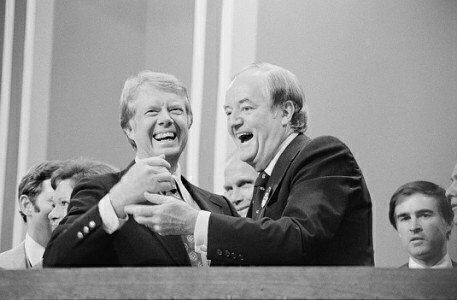Polling has played a controversial role in the presidential election process, and perhaps no polls are more closely watched than those taken right after a political party convention.

Long known as convention bump or convention bounce polls, these surveys gauge momentum after a week of promotion and pride at major national conventions. Since 1964, Richard Nixon, Jimmy Carter and Bill Clinton famously benefitted from post-convention popularity bumps, while John Kerry and Mitt Romney actually lost ground to their opponents.
But in recent years, some experts have questioned the effectiveness of convention bounce polling. Conventions have been held in back-to-back weeks, the theory goes, which doesn’t leave enough time for the post-convention bump to gain momentum.
FiveThirtyEight.com’s Nate Silver recently looked at the importance of the polling bounce concept.
“[Conventions] almost always produce polling ‘bounces’ in favor of the party that just held them. These bounces can be short-lived and aren’t always predictive,” said Silver. “Still, some part of the convention bounce usually sticks, and polls taken a few weeks after the conventions are generally much more accurate than those taken a few weeks beforehand.”
Several sets of numbers from recent and past conventions, however, show that these bumps aren’t nearly as big as they were in the 1964-2000 era of polling.
Political scientist Thomas M. Holbrook from the University of Wisconsin examined one set of numbers on his blog Politics By The Numbers. Using data from five sources going back to the Johnson-Goldwater contest in 1964, Holbrook says the average size of post-convention polling bounces was 6.9 percent in the 1964-1980 era, 6.2 percent in the 1984-1996 era, and just 2.4 percent in the 2000-2012 era.
“What is probably most important here is holding the conventions on consecutive weeks, which means that the convention messages end up overlapping and may cancel out each other. Another potential explanation lies in the increased polarization of the electorate,” Holbrook wrote.
Another set of numbers compiled by Gerhard Peters at the American Presidency Project at the University of California, Santa Barbara shows similar trends. Using Gallup and APP data, the average bump in the 2000-2012 era was 3.5 percent, compared with 7.3 percent in the 1980-1998 era. Excluding the 2000 conventions, where George W. Bush and Al Gore each saw an 8 percent post-convention bump, the last six conventions have averaged a 2.5 percent bounce for the candidates.
Silver said the numbers he looks at are the polling stats about one month after the conventions have concluded. By this measure, since 1972, national polls taken 30 days after the last convention have correctly forecast 11 of 11 winners in the popular vote, and 10 of 11 winners in the Electoral vote. (In 2000, Gore won the popular vote but lost the electoral vote to Bush.)
One mitigating factor could be the early timing of the 2016 conventions. The Republican convention in Cleveland was the earliest for the GOP since 1980, while the Democrats’ convention was the earliest since 2004 when their convention was held a month before the Republicans met in New York City.
In the current presidential election, it may be too soon to tell what kind of bump Republican candidate Donald Trump has received after the GOP convention in Cleveland. According to Real Clear Politics, seven polling organizations had conducted polling in July before the Republican convention. As of Monday morning, four has reported post-convention polls: CBS, CNN, Reuters, and Rasmussen, with Trump showing an average gain of three percent. Three other groups, ABC, NBC and The Economist, had yet to report post-convention numbers.







